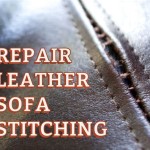Can Colin Be Used To Clean a Leather Sofa? Exploring the Risks and Alternatives
Leather sofas represent a significant investment in home furnishings, offering both aesthetic appeal and long-term durability when properly maintained. Maintaining their pristine condition necessitates careful selection of cleaning products and methods. A common question arises concerning the suitability of household cleaning products, specifically Colin, for cleaning leather sofas. While Colin is a popular and widely available glass and surface cleaner, its compatibility with leather requires careful consideration due to the material's unique properties and potential for damage.
Understanding the composition of Colin and the nature of leather is paramount in assessing the potential risks associated with its use. Colin typically contains ingredients such as alcohol, ammonia, and detergents, designed to dissolve grease and grime from hard, non-porous surfaces. Leather, on the other hand, is a natural material derived from animal hides, possessing a porous structure and a protective layer of natural oils. This natural oil layer keeps the leather supple and prevents cracking. The interaction between the chemicals in Colin and the leather's natural composition is where the primary concerns originate.
The potential risks associated with using Colin on leather sofas necessitate a thorough examination of its ingredients and their impact on the material. Alcohol, a common component in Colin, is a solvent that can strip leather of its natural oils, leading to dryness, cracking, and fading. Ammonia, another frequent ingredient, is an alkaline substance that can disrupt the leather's pH balance, potentially causing discoloration and weakening its fibers. Detergents, while effective for cleaning, can also remove the leather's natural oils and leave behind a residue that attracts dirt and grime. The combined effect of these chemicals can significantly degrade the leather's appearance and longevity.
Risk of Damage to Leather's Finish and Color
One of the primary concerns when using Colin on leather is the potential for damage to the finish and color. Leather sofas are often treated with a protective finish that enhances their appearance and provides resistance against wear and tear. This finish can be susceptible to damage from harsh chemicals like those found in Colin. The alcohol and ammonia content can dissolve or strip away the finish, leaving the leather vulnerable to stains, scratches, and fading. Color loss or alteration is another potential consequence. The dyes used to color leather can react negatively with the chemicals in Colin, leading to uneven color distribution or a complete change in hue. This is particularly problematic with aniline or semi-aniline leathers, which have more delicate finishes that are easily damaged by harsh cleaning agents.
Furthermore, the application method is crucial. Spraying Colin directly onto the leather surface can lead to oversaturation and uneven distribution of the cleaner. This can result in blotchy discoloration and potential water stains. Even if the cleaner is applied sparingly, the residue left behind can attract dirt and grime, negating the cleaning effect and potentially worsening the sofa's appearance over time. Ultimately, the use of Colin, intended for hard, non-porous surfaces, on the porous and delicate material of a leather sofa can compromise its aesthetic appeal and shorten its lifespan.
The Importance of pH Balance in Leather Care
Maintaining the pH balance of leather is critical for its long-term health and appearance. Leather is naturally slightly acidic, with a pH typically ranging between 4.5 and 5.5. This acidity helps to preserve the leather's fibers and prevent the growth of mold and mildew. Introducing alkaline substances, such as ammonia, can disrupt this delicate balance, leading to a range of problems. An increase in pH can cause the leather fibers to swell and become brittle, making them more susceptible to cracking and tearing. It can also accelerate the degradation of the leather's natural oils, further exacerbating dryness and stiffness.
Cleaning products specifically designed for leather are formulated with a neutral or slightly acidic pH to minimize the risk of damaging the material. These products typically contain mild detergents and conditioning agents that gently clean the surface without disrupting its natural pH balance. Using a pH-balanced cleaner ensures that the leather remains supple, resilient, and resistant to damage. In contrast, Colin, with its alkaline components, can significantly alter the leather's pH, leading to long-term deterioration that is often difficult or impossible to reverse. Regular use of such harsh chemicals can irrevocably damage the leather's structure and appearance.
Alternative Cleaning Solutions for Leather Sofas
Given the potential risks associated with using Colin on leather, it is imperative to explore safer and more effective alternative cleaning solutions. Specialized leather cleaners are formulated to gently remove dirt and grime without stripping the leather of its natural oils or disrupting its pH balance. These cleaners often contain conditioning agents that help to replenish moisture and maintain the leather's suppleness. Before applying any cleaning product, it is essential to test it on an inconspicuous area of the sofa to ensure that it does not cause discoloration or damage. Follow the manufacturer's instructions carefully, and avoid oversaturating the leather.
For minor spills and stains, a simple solution of mild soap and water can often be effective. Dampen a soft cloth with the solution and gently wipe the affected area. Avoid using excessive water, as this can damage the leather. After cleaning, dry the area with a clean, dry cloth. For more stubborn stains, such as ink or grease, consider consulting a professional leather cleaning service. These professionals have the knowledge and expertise to safely and effectively remove stains without damaging the leather. Regular dusting and vacuuming of the sofa can also help to prevent the buildup of dirt and grime, reducing the need for more intensive cleaning. Furthermore, applying a leather conditioner every few months can help to maintain the leather's moisture levels and prevent cracking.
In addition to commercially available leather cleaners, certain homemade solutions can be used with caution. A mixture of equal parts white vinegar and water can be effective for removing certain types of stains, but it is crucial to test it on an inconspicuous area first and to avoid using it on aniline or semi-aniline leathers. Olive oil can be used as a natural conditioner to help restore moisture to dry leather, but it should be applied sparingly and buffed thoroughly to prevent a greasy residue. It is always advisable to err on the side of caution when cleaning leather and to consult with a professional if you are unsure about the best approach.
Ultimately, the decision of whether or not to use Colin on a leather sofa hinges on a careful assessment of the risks and benefits. While Colin may be effective for cleaning hard, non-porous surfaces, its harsh chemicals can damage the delicate and porous nature of leather. The potential for stripping natural oils, disrupting pH balance, and damaging the finish far outweighs any perceived convenience. Safer and more effective alternatives are readily available, including specialized leather cleaners and gentle homemade solutions. By choosing the right cleaning products and methods, it is possible to maintain the beauty and longevity of a leather sofa for years to come.

Leather Vinyl Cleaning The Doctor

Leather Vinyl Cleaning The Doctor

Leather Vinyl Cleaning The Doctor

Commercial Leather Vinyl Cleaning The Doctor

Commercial Leather Vinyl Cleaning The Doctor

4 Ways To Clean A Leather Sofa Wikihow

Leather Furniture Cleaning Lucan Housekeeping Services

Leather Repair Suite Cleaning In Glasgow Edinburgh Tom Watson Upholstery

Leather Furniture Cleaning Lucan Housekeeping Services

4 Ways To Clean A Leather Sofa Wikihow
Related Posts








